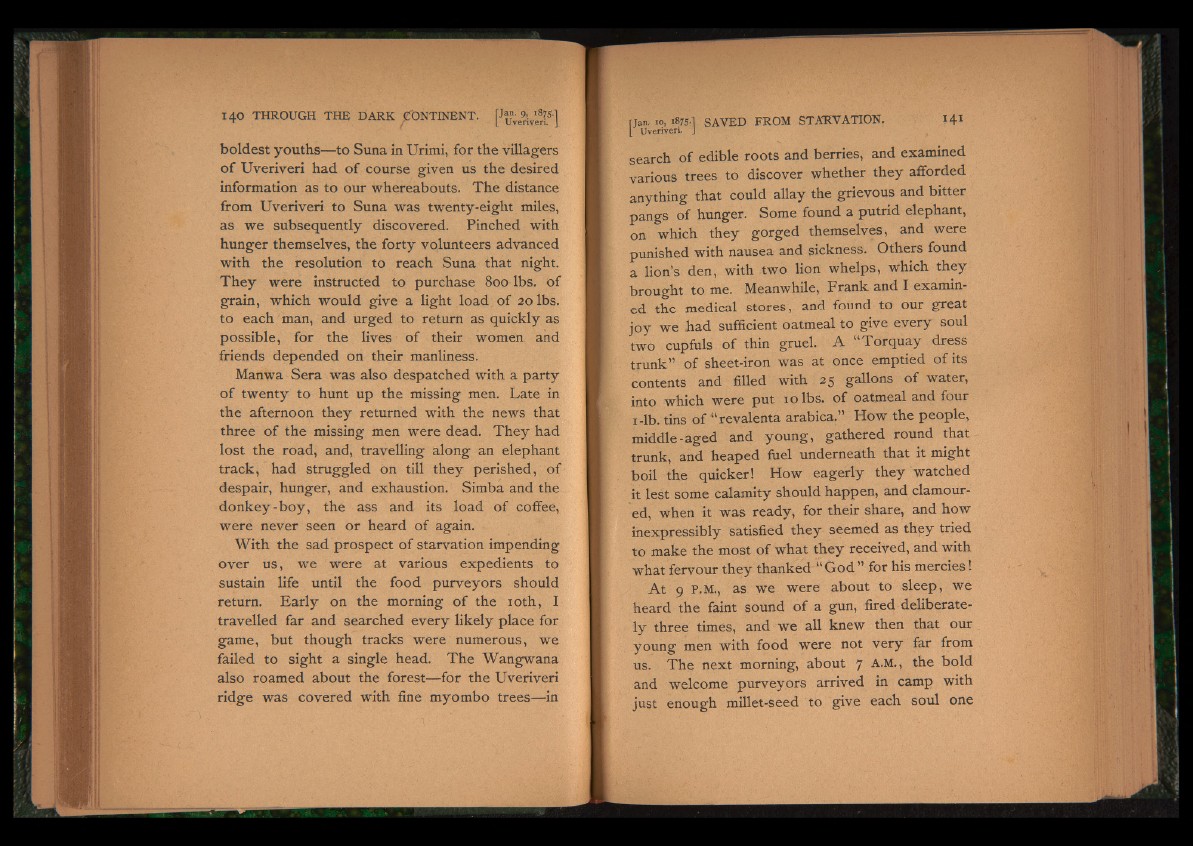
boldest youths— to Suna in Urimi, for the villagers
o f Uveriveri had o f course given us the desired
information as to our whereabouts. T h e distance
from Uveriveri to Suna was twenty-eight miles,
as we subsequently discovered. Pinched with
hunger themselves, the forty volunteers advanced
with the resolution to reach Suna that night.
T h e y were instructed to purchase 800 lbs. o f
grain, which would give a light load o f 20 lbs.
to each man, and urged to return as quickly as
possible, for the lives o f their women and
friends depended on their manliness.
Manwa Sera was also despatched with a party
o f twenty to hunt up the missing men. Late in
the afternoon th ey returned with the news that
three o f the missing men were dead. T h e y had
lost the road, and, travelling along an elephant
track, had struggled on till th ey perished, o f
despair, hunger, and exhaustion. Simba and the
d on k e y -b o y , the ass and its load o f coffee,
were never seen or heard o f again.
With the sad prospect o f starvation impending
over us, we were at various expedients to
sustain life until the food purveyors should
return. E a r ly on the morning o f the 10th, I
travelled far and searched every like ly place for
game, but though tracks were numerous, we
failed to sight a single head. The Wangwana
also roamed about the forest— for the Uveriveri
ridge was covered with fine myombo trees— in
rjati. 10, 1875.1 SAVED FROM STARVATION.
[ Uveriveri. J
search of edible roots and berries, and examined
various trees to discover whether th ey afforded
anything that could allay the grievous and bitter
pangs o f hunger. Some found a putrid elephant,
on which they gorged themselves, and were
punished with nausea and sickness. Others found
a lion’s den, with two lion whelps, which th ey
brought to me. Meanwhile, Frank and I examined
the medical stores, and found to our great
jo y we had sufficient oatmeal to give every soul
two cupfuls o f thin gruel. A “ Torq ua y dress
t r u n k ” o f sheet-iron was at once emptied o f its
contents and filled with 25 gallons o f water,
into which were put 10 lbs. o f oatmeal and four
1-lb. tins o f “ revalenta arabica.” How the people,
middle-aged and young, gathered round that
trunk, and heaped fuel underneath that it might
boil the quicker! How eage rly they watched
it lest some calamity should happen, and clamoured,
when it was ready, for their share, and how
inexpressibly satisfied th e y seemed as they tried
to make the most o f what th ey received, and with
what fervour they thanked “ God ” for his mercies!
A t 9 P.M., as we were about to sleep, we
heard the faint sound o f a gun, fired deliberately
three times, and we all knew then that our
young men with food were not v e ry far from
us. The next morning, about 7 A.M., the bold
and welcome purveyors arrived in camp with
just enough millet-seed to give each soul one